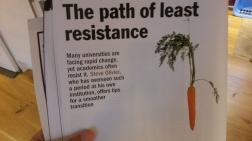Deadlines – often a necessary step to move things forward, but we need to talk about unnecessarily short windows of opportunities over traditional holiday and family times, and deadlines that implicitly encourage working through weekends. Of course there are some unavoidable short deadlines or deadlines constrained to a particular date, but here I refer to those deadlines where these is no particular time critical aspect. Short windows over traditional holiday times, particularly discriminate against those with caring responsibilities, especially those with school age children who are forced to take holiday actually LOOKING AFTER children during the school holidays. Whilst by no means exclusively affecting women, this may particularly discriminate against women, and against staff in certain age groups. Deadlines that seemingly encourage working over weekends or outside normal working hours are potentially more broadly damaging at a time when mental ill health is on the increase amongst University staff.
Some examples of, in my opinion, poor practice, include:
- an internal deadline for research proposals on the day that University and Schools return after Christmas. Whilst I know that these are set themselves relative to research council deadlines, in reality it means one of two things. Either you plan to get it done before the Christmas break (our University shuts down entirely between Christmas and New Year, and obviously some of us need to look after children during the School holidays even if that were not the case), or, you will be working over the Christmas break, squeezing in writing and editing around family or other commitments, and missing out on a chance for even the shortest of breaks. Some people will say the former is impossible due to teaching commitments. If your proposal involves multiple collaborators the latter becomes way more likely. There is of course a 3rd option, to decide not to apply, but this is a bold move given pressure to bring in funding.
- A similar internal deadline for internal promotion cases – given the relative under-representation of women in the professoriate, it is unfortunate that I know of several women for whom Christmas family responsibilities preclude working on promotion cases. There are doubtless men for whom this is also true, but I have not heard them speak about it explicitly.
- A research Council deadline for funding applications with the online application system only open for two weeks at the end of August. Despite notice being given, this short period of accessibility to the submission system discriminates against those forced to take holiday in the school holidays – the proximity to the bank holiday also makes this a popular holiday choice for many others. Holidays are often arranged a long time in advance and cannot be rearranged easily.
- A research council deadline for applicants to respond to the reviewers’ comments on their proposal, originally timetabled for the whole of August but subsequently narrowed to one week at the end including the bank holiday – similar problems to the preceding example – and interesting justified on the basis of needing to give the final panel at least two weekends to look at the papers (possible multiple problems here – but at least there is presumably a week in between the weekends!)
- Papers appearing at 4 pm for a 9.30 am meeting the following day OR at 4 pm on a Friday for a 9.30 am meeting on the immediately following Monday morning is also fairly unacceptable since it likely requires people to work in the evening or over the weekend or attend the meeting unprepared – a waste of time for everyone. For me working part-time, finishing at 3 on Fridays to do the school run – it guarantees I will not read them and therefore will not be able to contribute effectively to the meeting. Not exactly inclusive practice to enable diverse voices to be heard.
I am delighted to report that once attention was drawn to occurrence 4 above, positive changes were made. An email from one of the applicants resulted in an extension of the response period back towards the original plan, with reviewers’ comments being delivered as soon as they were received. In the case of 3, a solution is also under discussion. This willingness to reflect and react when the potential problems are pointed out is admirable and should be recognised. However, consider how much better it would be if organisations looked at their deadline setting through an inclusive lens from the get go.
Of course, no deadline will ever please everyone. But, there are perhaps some more obvious things to avoid:
- Short windows of opportunity in August (admittedly England-centric view)
- Deadlines immediately following significant national holiday periods
- Deadlines on Mondays
If deadlines are justified on the basis of timescales need to complete process, then either lengthen or shift the entire process, or perhaps preferably, consider whether you can simplify and reduce the process or paperwork to speed things up.
And if you want me to contribute in an informed way to a meeting, I need papers at least 2 working days in advance!






























